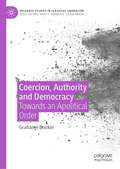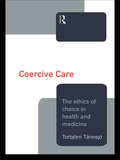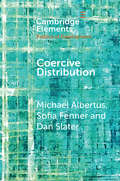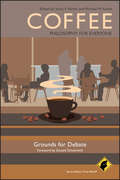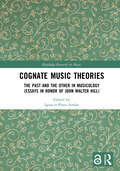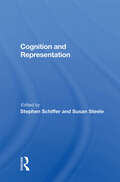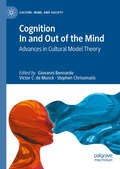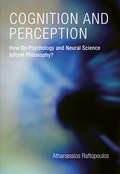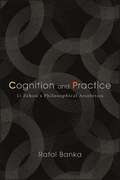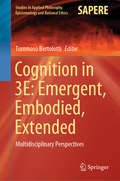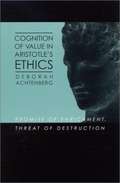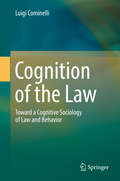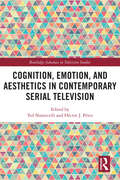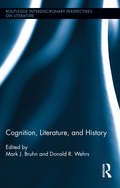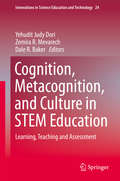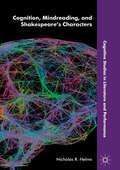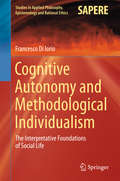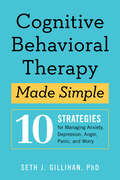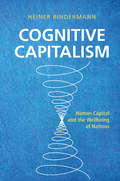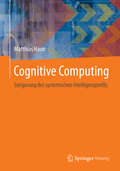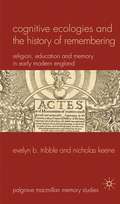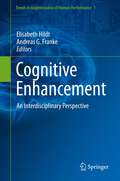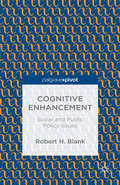- Table View
- List View
Coercion and Social Welfare in Public Finance
by Jorge Martinez-Vazquez Stanley L. WinerAlthough coercion is a fundamental and unavoidable part of our social lives, economists have not offered an integrated analysis of its role in the public economy. The essays in this book focus on coercion arising from the operation of the fiscal system, a major part of the public sector. Collective choices on fiscal matters emerge from and have all the essential characteristics of social interaction, including the necessity to force unwanted actions on some citizens. This was recognized in an older tradition in public finance which can still serve as a starting point for modern work. The contributors to the volume recognize this tradition, but add to it by using contemporary frameworks to study a set of related issues concerning fiscal coercion and economic welfare. These issues range from the compatibility of an open access society with the original Wicksellian vision to the productivity of coercion in experimental games.
Coercion, Authority and Democracy: Towards an Apolitical Order (Palgrave Studies in Classical Liberalism)
by Grahame BookerClassical liberalism has typically sought to maintain as much room as possible for the exercise of personal initiative in the face of the encroachment of states. This book explores these questions of coercion and authority in the context of the size and scope of the state and argues that the state and its agents should be held to the same moral rules as are the individuals it rules over. The book considers how a distinct feature of the state is its police or coercive power, about which one may ask how the state acquires it and what if anything would justify its use. It considers the implication that there is nothing inherent about state agents that entitles one to behave in ways that we would not accept from a private actor, and how once that argument is made, the state’s claim to authority is weakened. The author also discusses the extent to which democracy has been thought to provide any sort of justification for coercion or authority. This book will be of interest to academics and students of political philosophy, especially classical liberalism, and legal philosophy.
Coercive Care: Ethics of Choice in Health & Medicine
by Torbjorn TannsjoCoercive Care asks probing and challenging questions regarding the use of coercion in health care and the social services. The book combines philosophical analysis with comparative studies of social policy and law in a large number of industrialized countries.
Coercive Distribution (Elements in the Politics of Development)
by Dan Slater Michael Albertus Sofia FennerCanonical theories of political economy struggle to explain patterns of distribution in authoritarian regimes. In this Element, Albertus, Fenner, and Slater challenge existing models and introduce an alternative, supply-side, and state-centered theory of 'coercive distribution'. Authoritarian regimes proactively deploy distributive policies as advantageous strategies to consolidate their monopoly on power. These policies contribute to authoritarian durability by undercutting rival elites and enmeshing the masses in lasting relations of coercive dependence. The authors illustrate the patterns, timing, and breadth of coercive distribution with global and Latin American quantitative evidence and with a series of historical case studies from regimes in Latin America, Asia, and the Middle East. By recognizing distribution's coercive dimensions, they account for empirical patterns of distribution that do not fit with quasi-democratic understandings of distribution as quid pro quo exchange. Under authoritarian conditions, distribution is less an alternative to coercion than one of its most effective expressions.
Coffee - Philosophy for Everyone: Grounds for Debate (Philosophy for Everyone #26)
by Fritz Allhoff Michael W. Austin Scott F. ParkerOffering philosophical insights into the popular morning brew, Coffee -- Philosophy for Everyone kick starts the day with an entertaining but critical discussion of the ethics, aesthetics, metaphysics, and culture of coffee. Matt Lounsbury of pioneering business Stumptown Coffee discusses just how good coffee can be Caffeine-related chapters cover the ethics of the coffee trade, the metaphysics of coffee and the centrality of the coffee house to the public sphere Includes a foreword by Donald Schoenholt, President at Gillies Coffee Company
Cognate Music Theories: The Past and the Other in Musicology (Essays in Honor of John Walter Hill) (Routledge Research in Music)
by Ignacio Prats-ArolasThis volume explores the possibilities of cognate music theory, a concept introduced by musicologist John Walter Hill to describe culturally and historically situated music theory.Cognate music theories offer a new way of thinking about music theory, music history, and the relationship between insider and outsider perspectives when researchers mediate between their own historical and cultural position, and that of the originators of the music they are studying. With contributions from noted scholars of musicology, music theory, and ethnomusicology, this volume develops a variety of approaches using the cognate music theory framework and shows how this concept enables more nuanced and critical analyses of music in historical context.Addressing topics in music from the seventeenth to nineteenth centuries, this volume will be relevant to musicologists, music theorists, and all researchers interested in reflecting critically on what it means to construct a theory of music.
Cognition And Representation
by Stephen Schiffer Susan SteeleThis book is a result of a Cognitive Science program conducted to identify some of the leading issues and approaches that dominate in cognitive science research. The discussion is organized under four groups: psychological theories, mental representation, cognitive development, and semantic theory.
Cognition In and Out of the Mind: Advances in Cultural Model Theory (Culture, Mind, and Society)
by Victor C. de Munck Giovanni Bennardo Stephen ChrisomalisThis edited collection presents an agenda for the interdisciplinary study of anthropology and cognitive science. It consists of fifteen chapters written by international experts on the relationship between culture and cognition. This volume is unique in that it includes both inside (i.e., shared mental templates) and outside (i.e., extended, embedded, enactive and ecological) theories of cognition. The contributors come from the diverse disciplinary fields of anthropology, linguistics, archaeology, and cognitive science. The aim is to investigate the mental production of shared knowledge, goals, and desires around which human social life revolves. The coverage spans cultural and linguistic evolution, the importance of local histories, and the role of cultural models to understand and interact with the world. Drawing on cultural model theory, this volume is an invaluable resource for linguists, cognitive scientists, anthropologists, and other social scientists willing to explore and understand how the sharedness of culture can bond us all together across relative cultural differences and (mis)perceived divisions.
Cognition and Perception: How Do Psychology and Neural Science Inform Philosophy? (The\mit Press Ser.)
by Athanassios RaftopoulosAn argument that there are perceptual mechanisms that retrieve information in cognitively and conceptually unmediated ways and that this sheds light on various philosophical issues.In Cognition and Perception, Athanassios Raftopoulos discusses the cognitive penetrability of perception and claims that there is a part of visual processes (which he calls “perception”) that results in representational states with nonconceptual content; that is, a part that retrieves information from visual scenes in conceptually unmediated, “bottom-up,” theory-neutral ways. Raftopoulos applies this insight to problems in philosophy of science, philosophy of mind, and epistemology, and examines how we access the external world through our perception as well as what we can know of that world. To show that there is a theory-neutral part of existence, Raftopoulos turns to cognitive science and argues that there is substantial scientific evidence. He then claims that perception induces representational states with nonconceptual content and examines the nature of the nonconceptual content. The nonconceptual information retrieved, he argues, does not allow the identification or recognition of an object but only its individuation as a discrete persistent object with certain spatiotemporal properties and other features. Object individuation, however, suffices to determine the referents of perceptual demonstratives. Raftopoulos defends his account in the context of current discussions on the issue of the theory-ladenness of perception (namely the Fodor-Churchland debate), and then discusses the repercussions of his thesis for problems in the philosophy of science. Finally, Raftopoulos claims that there is a minimal form of realism that is defensible. This minimal realism holds that objects, their spatiotemporal properties, and such features as shape, orientation, and motion are real, mind-independent properties in the world.
Cognition and Practice: Li Zehou's Philosophical Aesthetics (SUNY series in Chinese Philosophy and Culture)
by Rafal BankaThis is the first book on the role of cognition in the aesthetic theory of Li Zehou (1930–2021), one of China's most important and influential contemporary philosophers. The cognitive dimension and its integration with practice is discussed by examining one of Li's pivotal concepts: "subjectality," a human subject shaped by the world in which they live, including beauty and aesthetic experience. Li's theory is also contextualized in the threefold inspiration coming from Confucian, Kantian, and Marxist philosophies, which differently conceptualize the aesthetic and cognitive dimensions in humans. By referring to different aesthetic theories and interdisciplinary approaches to cognition, the book aims to show how Li's cognitively oriented project can contribute to contemporary research into aesthetics. Although primarily written for philosophers working in aesthetics, Chinese, and comparative philosophy, the book is also addressed to anyone interested in contemporary Chinese thought.
Cognition and the Brain
by Andrew Brook Kathleen AkinsAn up-to-date and comprehensive overview of the philosophy and neuroscience movement.
Cognition in 3E: Multidisciplinary Perspectives (Studies in Applied Philosophy, Epistemology and Rational Ethics #56)
by Tommaso BertolottiThis book originated at a workshop by the same name held in May 2018 at the University of Pavia. The aim was to encourage a cross-disciplinary discussion on the limits of cognition. When venturing into cognitive science, notwithstanding the approach, one of the first riddles to be solved is the definition of cognition. Any definition immediately sparks the ascription debate: who/what cognizes? Definitions may appear either too loose, or too demanding. Are bacteria included? What about plants? Is it a human prerogative? We engage in the quest for artificial intelligence, but is artificial cognition already the case? And if it was a human prerogative, are we doing it all the time? Is cognition a process, or the sum of countless sub processes? Is it in the brain, or also in the body? Or does it go beyond the body? Where does it start? Where does it end? We tried answering these questions each from our own perspectives, as philosophers, ethnographers, psychologists and rhetoricians, handing each other our peculiar insight.
Cognition of Value in Aristotle's Ethics: Promise of Enrichment, Threat of Destruction
by Deborah AchtenbergArguing that metaphysics is central to ethics for Aristotle, Achetenberg (philosophy, U. of Nevada, Reno) uses a variety of strategies including textual interpretation as well as broader types of interpretation--elucidation of terms and their meanings in English, examination of a variety of texts from ancient Greek thought, and comparison of Aristotle's views with those of other philosophers and thinkers of different types. Annotation copyrighted by Book News, Inc.
Cognition of the Law: Toward a Cognitive Sociology of Law and Behavior
by Luigi CominelliThis book’s basic hypothesis – which it proposes to test with a cognitive-sociological approach – is that legal behavior, like every form of human behavior, is directed and framed by biosocial constraints that are neither entirely genetic nor exclusively cultural. As such, from a sociological perspective the law can be seen as a super-meme, that is, as a biosocial constraint that develops only in complex societies. This super-meme theory, by highlighting a fundamental distinction between defensive and assertive biases, might explain the false contradiction between law as a static and historical phenomenon, and law as a dynamic and promotional element. Socio-legal scholars today have to face the challenge of pursuing a truly interdisciplinary approach, connecting all the fields that can contribute to building a modern theory of normative behavior and social action. Understanding and framing concepts such as rationality, emotion, or justice can help to overcome the significant divide between micro and macro sociological knowledge. Social scientists who are interested in the law must be able to master the epistemological discourses of different disciplines, and to produce fruitful syntheses and bridge-operations so as to understand the legal phenomenon from each different point of view. The book adopts four perspectives: sociological, psychological, biological-evolutionary and cognitive. All of them have the potential to be mutually integrated, and constitute that general social science that provides common ground for exchange. The goal is to arrive at a broad and integrated view of the socio-legal phenomenon, paving the way for a comprehensive theory of norm-oriented and norm-perceived actions.
Cognition, Emotion, and Aesthetics in Contemporary Serial Television (Routledge Advances in Television Studies)
by Ted Nannicelli and Héctor J. PérezThis book posits an interconnection between the ways in which contemporary television serials cue cognitive operations, solicit emotional responses, and elicit aesthetic appreciation. The chapters explore a number of questions including: How do the particularities of form and style in contemporary serial television engage us cognitively, emotionally, and aesthetically? How do they foster cognitive and emotional effects such as feeling suspense, anticipation, surprise, satisfaction, and disappointment? Why and how do we value some serials while disliking others? What is it about the particularities of serial television form and style, in conjunction with our common cognitive, emotional, and aesthetic capacities, that accounts for serial television’s cognitive, socio-political, and aesthetic value, and its current ubiquity in popular culture? This book will appeal to postgraduates and scholars working in television studies as well as film studies, cognitive media theory, media psychology, and the philosophy of art.
Cognition, Literature, and History (Routledge Interdisciplinary Perspectives on Literature)
by Donald R. Wehrs Mark J. BruhnCognition, Literature, and History models the ways in which cognitive and literary studies may collaborate and thereby mutually advance. It shows how understanding of underlying structures of mind can productively inform literary analysis and historical inquiry, and how formal and historical analysis of distinctive literary works can reciprocally enrich our understanding of those underlying structures. Applying the cognitive neuroscience of categorization, emotion, figurative thinking, narrativity, self-awareness, theory of mind, and wayfinding to the study of literary works and genres from diverse historical periods and cultures, the authors argue that literary experience proceeds from, qualitatively heightens, and selectively informs and even reforms our evolved and embodied capacities for thought and feeling. This volume investigates and locates the complex intersections of cognition, literature, and history in order to advance interdisciplinary discussion and research in poetics, literary history, and cognitive science.
Cognition, Metacognition, and Culture in STEM Education: Learning, Teaching and Assessment (Innovations in Science Education and Technology #24)
by Yehudit Judy Dori Zemira R. Mevarech Dale R. BakerThis book addresses the point of intersection between cognition, metacognition, and culture in learning and teaching Science, Technology, Engineering, and Mathematics (STEM). We explore theoretical background and cutting-edge research about how various forms of cognitive and metacognitive instruction may enhance learning and thinking in STEM classrooms from K-12 to university and in different cultures and countries. Over the past several years, STEM education research has witnessed rapid growth, attracting considerable interest among scholars and educators. The book provides an updated collection of studies about cognition, metacognition and culture in the four STEM domains. The field of research, cognition and metacognition in STEM education still suffers from ambiguity in meanings of key concepts that various researchers use. This book is organized according to a unique manner: Each chapter features one of the four STEM domains and one of the three themes--cognition, metacognition, and culture--and defines key concepts. This matrix-type organization opens a new path to knowledge in STEM education and facilitates its understanding. The discussion at the end of the book integrates these definitions for analyzing and mapping the STEM education research.
Cognition, Mindreading, and Shakespeare’s Characters (Cognitive Studies In Literature And Performance Ser.)
by Nicholas R. HelmsCognition, Mindreading, and Shakespeare's Characters brings cognitive science to Shakespeare, applying contemporary theories of mindreading to Shakespeare’s construction of character. Building on the work of the philosopher Alvin Goldman and cognitive literary critics such as Bruce McConachie and Lisa Zunshine, Nicholas Helms uses the language of mindreading to analyze inference and imagination throughout Shakespeare’s plays, dwelling at length on misread minds in King Lear, Much Ado About Nothing, Othello, and Romeo and Juliet. Shakespeare manipulates the mechanics of misreading to cultivate an early modern audience of adept mindreaders, an audience that continues to contemplate the moral ramifications of Shakespeare’s characters even after leaving the playhouse. Using this cognitive literary approach, Helms reveals how misreading fuels Shakespeare’s enduring popular appeal and investigates the ways in which Shakespeare’s characters can both corroborate and challenge contemporary cognitive theories of the human mind.
Cognitive Autonomy and Methodological Individualism: The Interpretative Foundations of Social Life (Studies in Applied Philosophy, Epistemology and Rational Ethics #22)
by Francesco Di Iorio"Di Iorio offers a new approach to Hayek's Sensory Order, linking neuroscience to the old Verstehen tradition and to contemporary theories of self-organizing systems; this should be on the reading list of everyone who is interested in Hayek's thought. " Barry Smith University at Buffalo, editor of The Monist "This impressive and well-researched book breaks new ground in our understanding of F. A. Hayek and of methodological individualism more generally. It shows that methodological individualism sanctions neither an atomistic view of society nor a mechanical determinism. The book carefully analyzes an important tradition in the social sciences, and compares it to many important philosophical, sociological and economic systems of thought. This is an enlightening book for all scholars interested in the methodological problems of the social sciences. " Mario J. Rizzo New York University "One of Hayek's most important contributions is his linking of complex methodological individualism, which deals with the emergence of spontaneous orders and unintended collective structures in complex self-organizing social systems, with a cognitive psychology. What makes Francesco Di Iorio's book of great interest is that, by building on Hayek's seminal book The Sensory Order, it deepens the connections between cognition and rules of just conduct, taking into account relevant theories on subjectivity and consciousness such as phenomenology, hermeneutics and enactivism. " Jean Petitot École des Hautes Études en Sciences Sociales, EHESS, Paris "In this thoughtful and enlightening book Francesco Di Iorio uses Hayek's cognitive psychology as the starting point for investigation of the relationship between the autonomy of the agent and socio-cultural influences within methodological individualism. The book provides an illuminating and innovative analysis of a central issue in the philosophy of social science by setting Hayek's view on mind and action in fruitful relation to approaches such as Gadamer's hermeneutics, Merleau-Ponty's phenomenology, Varela's and Maturana's enaction, Boudon's interpretative sociology, Popper's fallibilism and Mises' praxeology. One of the most interesting aspects of this book is its argument that hermeneutics and fallibilism refer not to two different methods but to the same one. " Dario Antiseri Emeritus Professor at LUISS University, Rome "Francesco Di Iorio's book explores, in an original way, the connections between Hayek's methodological individualism and his fascinating idea that human mind is both an interpretative device and a self-organizing system. It is a brilliant, clearly written work, characterized by a certain intellectual courage, which makes a remarkable contribution to the sociology of knowledge. " Gérald Bronner Paris Diderot University
Cognitive Behavioral Therapy Made Simple: 10 Strategies for Managing Anxiety, Depression, Anger, Panic, and Worry (Retrain Your Brain with CBT)
by Seth J. Gillihan PhDCognitive behavior therapy strategies to help you manage anxiety and depression, whether you struggle with an anxiety disorder or are just feeling uneasy in life.Get lasting relief from anger, panic, stress, and other mood-related conditions by applying the principles of cognitive behavioral therapy to your daily life. From writing down your goals to addressing negative thought patterns, this accessible, easy-to-understand cognitive behavioral therapy book gives you everything you need to let the healing begin in one convenient CBT workbook. Soothe your mind, learn to grow as a person, overcome challenges, and boost your overall health and well-being.Explore cognitive behavior therapy in this workbook through:10 SOOTHING STRATEGIES: Discover proven CBT principles, like setting goals, maintaining mindfulness, and more.POSITIVE SELF-EVALUATIONS: Track your progress and reflect on what you've learned along the way.AN EXTRA TOOL FOR THERAPY: Use this workbook in tandem with clinical cognitive behavioral therapy or post-therapy.Progress toward healing with cognitive behavior therapy made simple.
Cognitive Capitalism: Human Capital and the Wellbeing of Nations
by Heiner RindermannNations can vary greatly in their wealth, democratic rights and the wellbeing of their citizens. These gaps are often obvious, and by studying the flow of immigration one can easily predict people's wants and needs. But why are there also large differences in the level of education indicating disparities in cognitive ability? How are they related to a country's economic, political and cultural development? Researchers in the paradigms of economics, psychology, sociology, evolution and cultural studies have tried to find answers for these hotly debated issues. In this book, Heiner Rindermann establishes a new model: the emergence of a burgher-civic world, supported by long-term background factors, furthered education and thinking. The burgher-civic world initiated a reciprocal development changing society and culture, resulting in past and present cognitive capital and wealth differences. This is an important text for graduate students and researchers in a wide range of fields, including economics, psychology, sociology and political science, and those working on economic growth, human capital formation and cognitive development.
Cognitive Computing: Steigerung des systemischen Intelligenzprofils
by Matthias HaunZiel des Buches ist, artifizielle Systeme als kognitive Modelle und damit als wissensbasierte Agenten zu konzeptionalisieren und diese Agentenmodelle durch rechnerbasierte Technologien in prozessualer und funktionaler Hinsicht zu kognitiven Probleml#65533;sungssysteme auszugestalten. Das Ziel eines solchen Ansatzes liegt in der Steigerung des systemischen Kognitionsquotienten solcher Systeme. Erreichbar wird dieses Ziel durch die Konzeptionalisierung von Modellen auf Basis einer Kognitionstheorie, der (Aus)implementierung dieser Modelle durch den Einsatz der Cognitive Computing Technologie unter Verwendung der Programmiersprache Java und der Validierung dieser L#65533;sungen im Rahmen von Simulationen. Das Buch wendet sich gleicherma#65533;en an Studierende, Fachleute aller Fachrichtungen als auch den interessierten Leser. Indem die einzelnen Kapitel einen Br#65533;ckenschlag zwischen Standardwissen und Wissen aus Nachbargebieten, wie Kognitionswissenschaft oder Informatik darstellen, versucht dieses Handbuch ein tiefgreifendes Verst#65533;ndnis des komplexen Themengebietes ,,Artifizielle Kognition" zu erm#65533;glichen und dabei dennoch voraussetzungsfrei lesbar zu bleiben.
Cognitive Ecologies and the History of Remembering
by Evelyn B. Tribble Nicholas KeeneThis book unites research in philosophy and cognitive science with cultural history to re-examine memory in early modern religious practices. Offering an ecological approach to memory and culture, it argues that models derived from Extended Mind and Distributed Cognition can bridge the gap between individual and social models of memory.
Cognitive Enhancement: An Interdisciplinary Perspective (Trends in Augmentation of Human Performance #1)
by Elisabeth Hildt Andreas G. FrankeCognitive enhancement is the use of drugs, biotechnological strategies or other means by healthy individuals aiming at the improvement of cognitive functions such as vigilance, concentration or memory without any medical need. In particular, the use of pharmacological substances (caffeine, prescription drugs or illicit drugs) has received considerable attention during the last few years. Currently, however, little is known concerning the use of cognitive enhancers, their effects in healthy individuals and the place and function of cognitive enhancement in everyday life. The purpose of the book is to give an overview of the current research on cognitive enhancement and to provide in-depth insights into the interdisciplinary debate on cognitive enhancement.
Cognitive Enhancement: Social and Public Policy Issues
by Robert H. BlankRapid advances in cognitive neuroscience and converging technologies have led to a vigorous debate over cognitive enhancement. This book outlines the ethical and social issues, but goes on to focus on the policy dimensions, which until now have received much less attention. As the economic, social and personal stakes involved with cognitive enhancement are so high, and the advances in knowledge so swift, we are likely to see increasing demands for government involvement in cognitive enhancement techniques. The book therefore places these techniques in a political context and brings the subsequent considerations and divisions to the forefront of the debate, situating their resolution within the milieu of interest group politics. The book will provide a starting point from which readers can develop a balanced policy framework for addressing such concerns.

